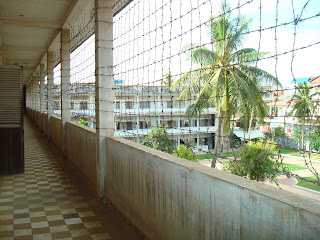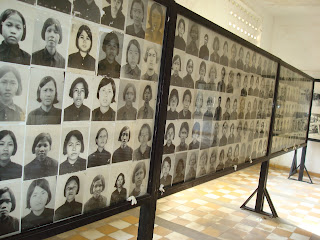
One of the biggest reasons that there are so many NGOs in Cambodia is due to the genocide that started in 1975. Pol Pot had this great idea that if all the educated, upper class were eliminated, the peasant class would be treated fairly. He abolished religion, culture, education ect. He brought the educated and professionals out to the rural areas and implemented forced labor, most died of starva
 tion. Over 1.5 million people died during the regime. He made sure all children of the adults who were killed were also killed so there wouldn’t be a chance of retrubution when the kids grew up. I don’t know all the details, but Pol Pot’s actions left a country without doctors, lawyers, teachers, bankers ect. To this day NGOs are trying hard to rebuild a society. You may have heard about lately it because of the trial held last week (maybe the word Cambodia caught your attention) The verdict came out that a senior commander, Duch, who was responsible for over 13,000 deaths was sentenced to 19 years. My friends who work for the courts were outraged, only 19 years? The number of children who died is incomprehensible. But, it is better than nothing.
tion. Over 1.5 million people died during the regime. He made sure all children of the adults who were killed were also killed so there wouldn’t be a chance of retrubution when the kids grew up. I don’t know all the details, but Pol Pot’s actions left a country without doctors, lawyers, teachers, bankers ect. To this day NGOs are trying hard to rebuild a society. You may have heard about lately it because of the trial held last week (maybe the word Cambodia caught your attention) The verdict came out that a senior commander, Duch, who was responsible for over 13,000 deaths was sentenced to 19 years. My friends who work for the courts were outraged, only 19 years? The number of children who died is incomprehensible. But, it is better than nothing.Pics from top to bottom



Photos 1, 2, 3- After s
omeone was taken by the Khmer Rouge, they were brought to Toul Slang, a prison where they were held for a length of time between 2-6 months. They were tortured, starved, and interrogated for names of people who were "potential threats"
4- They would take a photo of a prison
er, there are over 8 rooms full of frames like this
5- The Killing Fields, this is where they brought the "prisoners" to have them killed. They dug mass graves and pushed them in. They used alternative methods to exterminate them since bullets were expensive.

6- They have begun excavating the mass graves and have built a memorial to honor them within the Buddhist culture
Background:
Cambodian jungle in the 1960s, advocated a radical Communist revolution that would wipe out Western influences in Cambodia and set up a solely agrarian society. In 1970, aided by North Vietnamese and Viet Cong troops, Khmer Rouge guerrillas began a large-scale insurgency against Cambodian government forces, soon gaining control of nearly a third of the country.
 By 1973, secret U.S.
By 1973, secret U.S.
 By 1973, secret U.S.
By 1973, secret U.S. bombings of Cambodian territory controlled by the Vietnamese Communists forced the Vietnamese out of the country, creating a power vacuum that was soon filled by Pol Pot's rapidly growing Khmer Rouge movement. In April 1975, the Khmer Rouge captured Phnom Penh, the Cambodian capital, overthrew the pro-U.S. regime, and established a new government, the Kampuchean People's Republic.
As the new ruler of Cambodia, Pol Pot set about transforming the country into his vision of an agrarian utopia. The cities were evacuated, factories and
As the new ruler of Cambodia, Pol Pot set about transforming the country into his vision of an agrarian utopia. The cities were evacuated, factories and

schools were closed, and currency and private property was abolished. Anyone believed to be an intellectual, such as someone who spoke a foreign language, was immediately killed. Skilled workers were also killed, in addition to anyone caught in possession of eyeglasses, a wristwatch, or any other modern technology. In forced marches punctuated with atrocities from the Khmer Rouge, the millions who failed to escape Cambodia were herded onto rural collective farms.
Between 1975 and 1978, an estimated two million Cambodians died by execution, forced labor, and famine. In 1978, Vietnamese troops invaded Cambodia, capturing Phnom Penh in early 1979. A moderate Communist government was established, and Pol Pot and the Khmer Rouge retreated back into the jungle.
In 1985, Pol Pot officially retired but remained the effective head of the Khmer Rouge, which continued its guerrilla actions against the government in Phnom Penh. In 1997, however, he was put on trial by the organization after an internal power struggle ousted him from his leadership position. Sentenced to life imprisonment by a "people's tribunal," which critics derided as a show trial, Pol Pot later declared in an interview, "My conscience is clear." Much of the international community hoped that his captors would extradite him to stand trial for his crimes against humanity, but he died of apparently natural causes while under house arrest in 1998.
Still interested- check out these sites:
http://www.msnbc.msn.com/id/38356506/ about the trial
http://www.ppu.org.uk/genocide/g_cambodia.html more background info
Movie: The killing fields (on demand on Netflix i think)
Between 1975 and 1978, an estimated two million Cambodians died by execution, forced labor, and famine. In 1978, Vietnamese troops invaded Cambodia, capturing Phnom Penh in early 1979. A moderate Communist government was established, and Pol Pot and the Khmer Rouge retreated back into the jungle.
In 1985, Pol Pot officially retired but remained the effective head of the Khmer Rouge, which continued its guerrilla actions against the government in Phnom Penh. In 1997, however, he was put on trial by the organization after an internal power struggle ousted him from his leadership position. Sentenced to life imprisonment by a "people's tribunal," which critics derided as a show trial, Pol Pot later declared in an interview, "My conscience is clear." Much of the international community hoped that his captors would extradite him to stand trial for his crimes against humanity, but he died of apparently natural causes while under house arrest in 1998.
Still interested- check out these sites:
http://www.msnbc.msn.com/id/38356506/ about the trial
http://www.ppu.org.uk/genocide/g_cambodia.html more background info
Movie: The killing fields (on demand on Netflix i think)
No comments:
Post a Comment